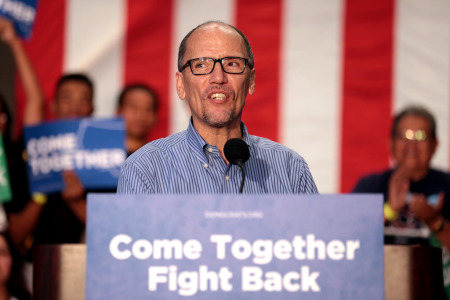Democrats pass resolution praising religiously unaffiliated Americans, deriding religious liberty

Democrats passed a resolution lauding religiously unaffiliated voters and framing religious liberty as a threat to civil rights.
The resolution, which passed unanimously at the Democratic National Committee's summer meeting in San Francisco on Aug. 24, was championed by the Secular Coalition of America, an group representing atheists, agnostics, and humanists on policy matters, multiplereports say.
"Religiously unaffiliated Americans overwhelmingly share the Democratic Party’s values," the resolution reads, emphasizing advocacy for "rational public policy based on sound science and universal humanistic values."
This marks the first time a major political party recognized this demographic in such formal fashion, a move the coalition praised.
"America was founded as a secular government charged with representing and protecting the freedoms of people of all faiths and none," said Sarah Levin, director of governmental affairs for the Secular Coalition of America.
"I am proud to see the Democratic Party take that to heart by bringing secular Americans into the fold."
The resolution goes on to criticize religious Americans and refers to religious freedom claims as discriminatory.
“[T]hose most loudly claiming that morals, values, and patriotism must be defined by their particular religious views have used those religious views, with misplaced claims of ‘religious liberty,’ to justify public policy that has threatened the civil rights and liberties of many Americans, including but not limited to the LGBT community, women, and ethnic and religious/nonreligious minorities,” it reads.
Michael Wear, an evangelical Christian who served in the Obama administration and is the author of Redeeming Hope, called the move "idiotic."
"These people actually approved a resolution with the claim: 'the religiously unaffiliated demographic represents the largest religious group within the Democratic Party.' Because protestants are all divided with their denominations, but the religiously unaffiliated are coherent," he tweeted Thursday.
"This is both politically stupid, but also, just stupid on a fundamental level that transcends electoral politics," he continued, adding, "Trump is absolutely going to run this into the ground, and not just with white evangelicals."
Although there are some caveats about the numbers, exit polls from the 2016 election results indicated that 81 percent of white evangelicals supported Trump.
Annie Laurie Gaylor, co-president of the Wisconsin-based Freedom From Religion Foundation, considers the resolution an overdue "political landmark."
Her group is hopeful that the move is "a sign of bigger and better things to come for freethinkers, and would like to see every party at every level of government adopt similar resolutions."
In recent weeks, however, Democratic presidential candidates have been signaling the opposite of the resolution, sharpening their message to religiously motivated voters.
Earlier this month at a joint venture of the Black Church PAC and the Young Leaders Conference in Georgia, several candidates spoke of the role of their faith and how it intersects with their approach to politics.
“I get very frustrated when people want to try to separate this idea of the role of the church and the role of the civic space,” said Sen. Cory Booker of New Jersey.
“That is just not true. You could no more divide your own body. The church is not four walls. The church is the body of Christ.”
Senator Elizabeth Warren, D-Mass., explained that her political ambitions stem from God's call on her life.
"Never in a million years did I think I’d end up running for office, first for United States Senator from Massachusetts, and now for president of the United States. But the reason I did is I have been called to act," she said at a church service in Columbia, South Carolina that same weekend.





















